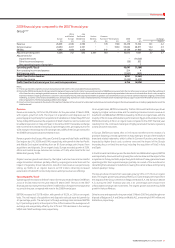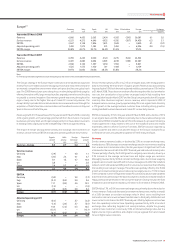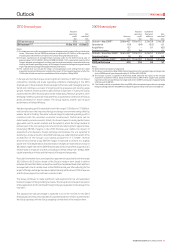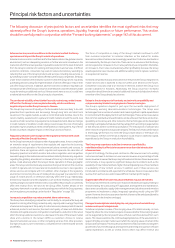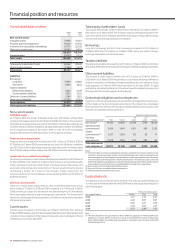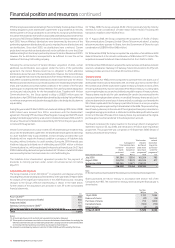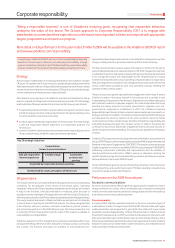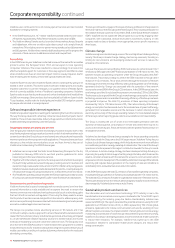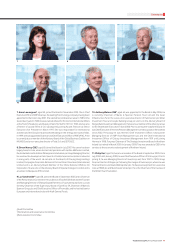Vodafone 2009 Annual Report Download - page 41
Download and view the complete annual report
Please find page 41 of the 2009 Vodafone annual report below. You can navigate through the pages in the report by either clicking on the pages listed below, or by using the keyword search tool below to find specific information within the annual report.
Performance
Vodafone Group Plc Annual Report 2009 39
profitability identified within other risk factors in this section such as intensifying
competition, pricing pressures, regulatory changes and the timing for introducing
new products or services. Due to the Group’s substantial carrying value of goodwill
under International Financial Reporting Standards, the revision of any of these
assumptions to reflect current or anticipated changes in operations or the financial
condition of the Group could lead to an impairment in the carrying value of certain
assets in the Group. While impairment does not impact reported cash flows, it does
result in a non-cash charge in the consolidated income statement and thus no
assurance can be given that any future impairments would not affect the Company’s
reported distributable reserves and therefore its ability to make distributions to
its shareholders or repurchase its shares. See “Critical accounting estimates” on
page 71.
The Group’s geographic expansion may increase exposure to unpredictable
economic, political and legal risks.
Political, economic and legal systems in emerging markets historically are less
predictable than in countries with more developed institutional structures. As the
Group increasingly enters into emerging markets, the value of the Group’s investments
may be adversely affected by political, economic and legal developments which are
beyond the Group’s control.
Expected benefits from acquisitions may not be realised.
The Group has made significant acquisitions, which are expected to deliver benefits
resulting from the anticipated growth potential of the relevant markets. However,
there is no assurance as to the successful integration of companies acquired by the
Group or the extent to which the anticipated benefits resulting from the acquisitions
will be achieved.
The Company’s strategic objectives may be impeded by the fact that it does
not have a controlling interest in some of its ventures.
Some of the Group’s interests in mobile licences are held through entities in which it
is a significant, but not a controlling owner. Under the governing documents for some
of these partnerships and corporations, certain key matters such as the approval of
business plans and decisions as to the timing and amount of cash distributions
require the consent of the partners. In others, these matters may be approved
without the Company’s consent. The Company may enter into similar arrangements
as it participates in ventures formed to pursue additional opportunities. Although the
Group has not been materially constrained by the nature of its mobile ownership
interests, no assurance can be given that its partners will not exercise their power of
veto or their controlling influence in any of the Group’s ventures in a way that will
hinder the Group’s corporate objectives and reduce any anticipated cost savings or
revenue enhancement resulting from these ventures.
Expected benefits from investment in networks, licences and new
technology may not be realised.
The Group has made substantial investments in the acquisition of licences and in its
mobile networks, including the roll out of 3G networks. The Group expects to
continue to make significant investments in its mobile networks due to increased
usage and the need to offer new services and greater functionality afforded by new
or evolving telecommunications technologies. Accordingly, the rate of the Group’s
capital expenditures in future years could remain high or exceed that which it has
experienced to date.
There can be no assurance that the introduction of new services will proceed
according to anticipated schedules or that the level of demand for new services will
justify the cost of setting up and providing new services. Failure or a delay in the
completion of networks and the launch of new ser vices, or increases in the associated
costs, could have a material adverse effect on the Group’s operations.
The Group’s business and its ability to retain customers and attract new
customers may be impaired by actual or perceived health risks associated
with the transmission of radio waves from mobile telephones, transmitters
and associated equipment.
Concerns have been expressed in some countries where the Group operates that
the electromagnetic signals emitted by mobile telephone handsets and base
stations may pose health risks at exposure levels below existing guideline levels and
may interfere with the operation of electronic equipment. In addition, as described
under the heading “Legal proceedings” in note 33 to the consolidated financial
statements, several mobile industry participants, including the Company and
Verizon Wireless, have had lawsuits filed against them alleging various health
consequences as a result of mobile phone usage, including brain cancer. While the
Company is not aware that such health risks have been substantiated, there can be
no assurance that the actual, or perceived, risks associated with radio wave
transmission will not impair its ability to retain customers and attract new customers,
reduce mobile telecommunications usage or result in further litigation. In such
event, because of the Group’s strategic focus on mobile telecommunications, its
business and results of operations may be more adversely affected than those of
other companies in the telecommunications sector.
The Group’s business would be adversely affected by the non-supply
of equipment and support services by a major supplier.
Companies within the Group source network infrastructure and other equipment, as
well as network-related and other significant support services, from third party
suppliers. The withdrawal or removal from the market of one or more of these major
third party suppliers could adversely affect the Group’s operations and could result
in additional capital or operational expenditures by the Group.




